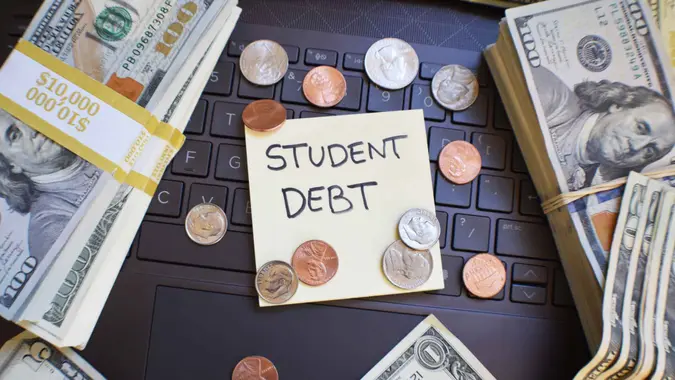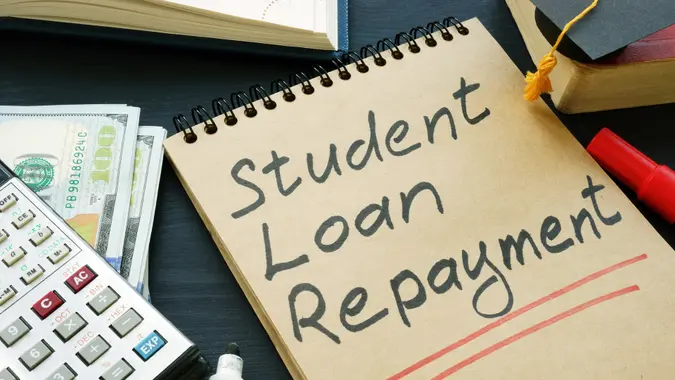6 Tips on Dealing With Student Loan Debt in Early 2025

Commitment to Our Readers
GOBankingRates' editorial team is committed to bringing you unbiased reviews and information. We use data-driven methodologies to evaluate financial products and services - our reviews and ratings are not influenced by advertisers. You can read more about our editorial guidelines and our products and services review methodology.

20 Years
Helping You Live Richer

Reviewed
by Experts

Trusted by
Millions of Readers
Student loan debt can quickly get out of hand if you’re not careful. Even if you are managing to make the payments every month, it can feel overwhelming. You need a good strategy to pay them off.
A recent press release from the Illinois CPA Society has some useful advice for getting your loans paid off. Here are seven great tips to help you get a handle on your student loan debt in the coming year.
Apply for an Income-Driven Repayment Plan
An Income-Driven Repayment (IDR) plan can help if you’re struggling to make payments. These plans cap your monthly payment based on your income and family size.
This can mean much lower payments than you’d normally have. Programs like Income-Based Repayment (IBR) or Pay As You Earn (PAYE) can also extend your repayment period to 20 or 25 years, with any remaining balance forgiven at the end of the term.
“Individuals who qualify may be able to lower their monthly payments or possibly earn loan forgiveness after a certain number of qualifying payments. The clock is also ticking on certain loan forgiveness programs with tax-free status, so the time to act is now,” The Illinois CPA Society press release advised.
To apply for an IDR plan, visit the Federal Student Aid website and complete the application process. You’ll also need to recertify your income and family size each year to stay eligible.
See If You Qualify for Public Service Loan Forgiveness
If you work in public service, such as a government job or a nonprofit, you might qualify for Public Service Loan Forgiveness (PSLF). This program forgives the remaining balance on your loans, if you’ve made 120 monthly payments while working full-time in one of these jobs.
“If you work for a qualifying employer and are on an income driven repayment plan, you may be eligible for forgiveness after 10 years,” explained Patti Hughes, president of Lake Life Wealth Advisory Group.
The program is meant to reward those who dedicate their careers to public service. Be sure to double-check the type of loans you have — only certain federal loans are eligible.
Consolidate Parent PLUS Loans
If your parents have taken out Parent PLUS loans to help you with college, consolidating them into a direct consolidation loan could make paying them off easier.
This is a way to combine different loans into one. You end up with just one payment a month.
“If you have Parent Plus loans, make sure to take advantage of the double consolidation loophole before the deadline next year,” said Hughes. “This can result in much lower payments by giving the borrower access to different income driven repayment plans.”
Consolidating also makes income-contingent repayment plans for Parent PLUS loans an option. Just remember, if you’re working towards any forgiveness programs, consolidation may reset the clock, so consider it carefully.
Automatic Payments
Setting up autopay can help you stay on track with paying off your debt. Sometimes you can even get a small discount on your interest rate as an incentive. You can save a little money on interest and make sure you never miss a payment.
“This is a great budgeting practice that’ll help you repay your loans on time (and faster if you elect to pay more than the minimum payment due),” the press release stated.
Autopay takes the stress out of remembering due dates, and that way you have one less thing to worry about each month.
Refinance Your Student Loans
Refinancing can be a smart option. When you refinance, a private lender pays off your existing loans and issues you a new loan.
You can usually get a lower interest rate than you were paying before, especially if you have a good credit score and a stable income.
“Take note of your student loans and their interest rates,” the press release said. “Sometimes, consolidating and refinancing eligible loans can lower your overall interest rate and make meeting the repayment obligations easier. If refinancing isn’t an option, prioritizing paying down the loans bearing the highest interest can pay dividends down the line.”
But be careful about refinancing federal loans into a private loan. You lose access to federal benefits, like income-driven repayment plans and forgiveness programs.
Check With Your Employer To See If They Offer 401(k) Matching for Student Loan Payments
This won’t help you pay off your student loans. But it’s a good idea anyway.
If your employer offers this benefit, they’ll match any student loan payment you make with an equal contribution to your 401(k).
“This is a new benefit that can be offered by employers,” said Hughes. “It allows the employee to get a 401(k) match for the amount of student loan payments made.”
If your employer offers this perk, take full advantage of it. It’s essentially free money. And as you pay off your debt, you’re also putting away money for retirement.
 Written by
Written by  Edited by
Edited by 
























